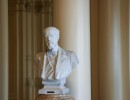On 19 October 1914, at the age of 71, the national hero Julio Argentino Roca, one of the most influential figures in Argentine history, died in Buenos Aires. Twice president of the Argentine Republic and an outstanding military man, Roca left an indelible mark on politics and the development of the modern state.
Born in San Miguel de Tucumán on 17 July 1843, Roca was the third of nine children. His career began in the classrooms of the Colegio de Concepción del Uruguay, where he forged friendships with future outstanding personalities of the country. But his real leap into the public arena came with his participation in several military campaigns that consolidated his leadership and prestige at the national level.
Roca was present at crucial battles such as Cepeda, Pavón and the War of the Triple Alliance, conflicts that shaped his vision of the importance of order and the centralisation of power in a country constantly affected by war. This experience led him to promote the professionalisation of the army.
In 1879 he led the Desert Campaign as Minister of War, an event that succeeded in consolidating the national territory and asserting Argentine sovereignty over Patagonia.
During his first term (1880-1886), Roca promoted a policy of centralisation that included the federalisation of Buenos Aires, monetary unification and the construction of key infrastructure, such as ports and railways, which facilitated the agro-export boom. His motto, ‘Peace and Administration’, reflected his quest for internal order and economic development. Roca's Argentina was fully inserted into the international market, attracting strong European immigration that transformed the country's social structure.
In his second term (1898-1904), his focus on the organisation of the army and navy, along with reforms such as the Compulsory Conscription Law, continued to consolidate state power.
After leaving the presidency, Roca gradually withdrew from public life, although he remained active in diplomacy. He travelled to Europe and participated in diplomatic missions in Brazil until his last years.
Roca died at the age of 71 in Buenos Aires. His political and economic vision laid the foundations of the modern Argentine state, with a development and modernisation project that transformed the country into a world economic power at the end of the 19th century. To revalue his figure is to recognise the importance of his work in the construction of a sovereign, prosperous and orderly country.
His memory is present in the Government House. In homage to him, there is a bust in the Hall of Honour, a striking painting in the Hall of the Proceres and another in the Casa Rosada Museum.

